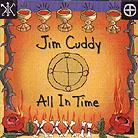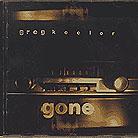March 1999
Cuddy's All in Time confirms that the pop-and-country flavoring of the group is primarily due to him. While All in Time does not necessarily break any new musical ground for Cuddy, it does push his style forward with a set of 11 songs that, with a few exceptions, are at least the equal of the best of Rodeo -- not an easy feat and quite unexpected. "Second Son" is the opener and resembles the catchy pop nature of Rodeo's Casino. Tracks two and three, "Whistler" and "Disappointment," turn slightly darker, but are bouncy and catchy enough to keep fans delighted. "Too Many Hands" is where the album really kicks into gear. It's probably the strongest single track of the disc. Cuddy's voice has always been impressive, but here he seems to have it mastered. The delivery is easy-going and understated, but as listenable and powerful as his best ballads. Same goes, more or less, for "Slide Through Your Hands," "Everybody Cries" and "Making My Way To You," the last sounding something like Chris Isaak does on his last few albums. Not a clunker exists, and everyone will likely pick favorites. Gone, for the most part, eschews any pop-like country conventions that the group may have had and goes straight for the soul with a dagger. Despite a few moments of levity, Gone contains Keelor's darkest music to date. Hints at despair that poked through in the latest Rodeo discs are highlighted here. The closest comparison I can think of is Leonard Cohen on a bad day. While an ample supply of Prozac may brightened the situation, Gone sounds more like a cleansing for Keelor's soul, which he may have needed. From the bleak opener, "When I See You," to the the second track "Redemption" (my favorite), Keelor gets most of his ghosts out. Following these tracks, "All Our Heroes," which on any other album would be considered as upbeat as Pink Floyd's "Comfortably Numb," sounds positively inspirational here. "No Landing," admittedly, has a lighter feel and is recorded with a minimal amount of instrumentation -- ideal. The same can said for "Star of the Show," which can get a few toes tapping. At home on a Blue Rodeo album or here, these are a couple of Keelor's best tunes to date. While it's easy to joke about the downtrodden nature of this disc, I love what Keelor's done here. For those who don't necessarily see things through rose-colored glasses, this collection is a god-send. Sure, it's downbeat and pulls no punches and will even be considered boring by some. But it reaches far deeper and has far more impact than 99% of the music released in a given year. For people who enjoy this type of music, people like me, Gone is a relief. Life can't be all fun and games, can it? Recording quality ranges on both discs from very good to excellent. They each resemble, at times, Blue Rodeo's extremely good-sounding Five Days in July. Because they are multi-tracked recordings, the soundstage on each is entirely artificial. However, it's quite well placed, has good depth with excellent separation and detail. The nod for sonic quality goes to Gone. It is a little more consistent throughout and even approaches reference quality at times, with a warm, lush sound, haunting ambience and some simply killer bass. Full production credits on Gone go to Pierre Marchand, who is also responsible for Sarah McClachlan's excellent and very similar-sounding, The Freedom Sessions. McClachlan, incidentally, appears throughout Gone in a piano-playing and background-vocalist role. Both albums have had an easy time finding their audiences in Canada and abroad. In beer terms (Canadian, of course), I would describe All in Time as the type of disc you listen to when you want to have, say, four beers -- perhaps five or six at the very most. It will give you a light-headed buzz, and you'll still wake up in the morning. Keelor's Gone, on the other hand, is what you sit down and listen to with at least a 12-pack on hand, perhaps even two. Waking up in the morning won't be a priority. In fact, you may not even make it there. GO BACK TO: |
 Jim Cuddy - All in Time
Jim Cuddy - All in Time Greg Keelor - Gone
Greg Keelor - Gone![[Reviewed on CD]](../format/regcd.gif) Fans of
Canada's Blue Rodeo know the group's two personalities -- the two lead vocalists. On one
side is the brooding, spontaneous Greg Keelor, whose nasally vocals, sporadic guitar riffs
and tendency toward '60s psychedelia and heavy metal bring an edge to the band. On the
other side, Jim Cuddy contrasts this with pristine and smooth vocals of impressive range
that soars in a way most country artists can only dream of. Together they balance Blue
Rodeo and make them one of the finest acts to surface from Canada -- or anywhere else.
Together Keelor and Cuddy are not only Blue Rodeo's frontmen, they are the songwriters for
the group. While fans respect both, most choose a favorite. Perhaps out of a need to
further identify themselves, both Keelor and Cuddy released solo albums in 1997 and 1998.
Fans of
Canada's Blue Rodeo know the group's two personalities -- the two lead vocalists. On one
side is the brooding, spontaneous Greg Keelor, whose nasally vocals, sporadic guitar riffs
and tendency toward '60s psychedelia and heavy metal bring an edge to the band. On the
other side, Jim Cuddy contrasts this with pristine and smooth vocals of impressive range
that soars in a way most country artists can only dream of. Together they balance Blue
Rodeo and make them one of the finest acts to surface from Canada -- or anywhere else.
Together Keelor and Cuddy are not only Blue Rodeo's frontmen, they are the songwriters for
the group. While fans respect both, most choose a favorite. Perhaps out of a need to
further identify themselves, both Keelor and Cuddy released solo albums in 1997 and 1998.